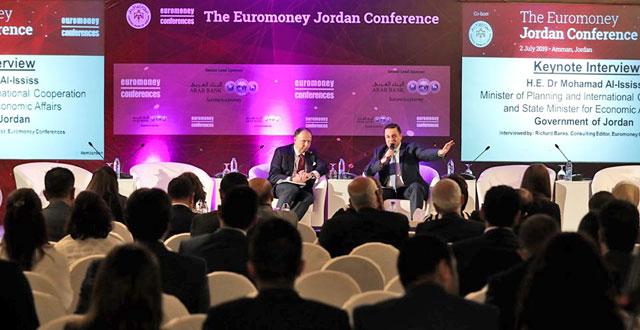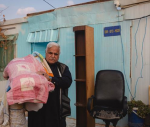You are here
Euromoney conference examines path to sustainable economy
By Elizabeth Turnbull - Jul 03,2019 - Last updated at Jul 03,2019

Minister of Planning and International Cooperation and State Minister for Economic Affairs Mohamad Al-Ississ and consulting editor and moderator Richard Banks (left) at the Euromoney conference in Amman on Tuesday (Photo courtesy of the Planning Ministry’s Facebook)
AMMAN — In order to work towards a more sustainable economy, Jordan needs to focus on cost reduction, the growth of exports and the labour market, according to panellists at the Jordan Euromoney conference held on Tuesday.
While it has averted a crisis, Jordan's economy, as it is currently structured, remains unsustainable on the longterm, according to the consulting editor and moderator at the Euromoney conference, Richard Banks.
Its sixth annual conference in Jordan, this year’s Euromoney conference examined the Kingdom’s economic potential and its path towards macroeconomic stability, according to a Euromoney statement.
With the strong support of the international community, Sirpa Tulla, head of the economic, infrastructure and trade facilitation section of Delegation of the European Union, said she believes "Jordan is in a very good situation to do the reforms."
Jordan's next steps should be to prioritise increasing the domestic demand for exports, focus on public-private partnerships and on reforms to public procurement, allowing smaller firms to compete for public sector contracts, according to World Bank Lead Economist for the Middle East Department Christos Kostopoulos.
Tulla suggested that while there are reforms at the legislative level, critical actions have to be undertaken on the ground level, in order for changes to reach ordinary people. Tulla emphasised that there is "no time for complacency".
In order for Jordan to become a more attractive destination for private capital, Stephen Vineburg, CEO of ASMA Capital Partners, said that Jordan needs to be prepared to explain to foreign investors how a potential project will be paid for, what the commitment of the government is and what legislation will accompany a proposed project.
In addition, central to obtaining foreign investors is the idea of precedent, according to Vineburg. Investors want to see a similar project that has been done before.
A good example of a government-directed project with private partnerships is Queen Alia International Airport, according to Vineburg, who suggests that similar thinking should be applied in other sectors.
Rather than focusing simply on cutting costs, there needs to be a focus on increasing income, according to the panel.
Tulla also noted that issues of climate change, water shortages and the shorter-term issue of debt should also be kept in mind.
Related Articles
AMMAN — Euromoney Conferences will hold its annual Euromoney Jordan Conference on Wednesday, March 22 to highlight the role that financial e
AMMAN — The European Union (EU)-funded Language and Academic Skills and e-Learning Resources (LASER) project held its end-of-project ceremon
AMMAN — Seventy entrepreneurs representing Jordanian start-ups came together this weekend to take part in a three-day idea development chall















